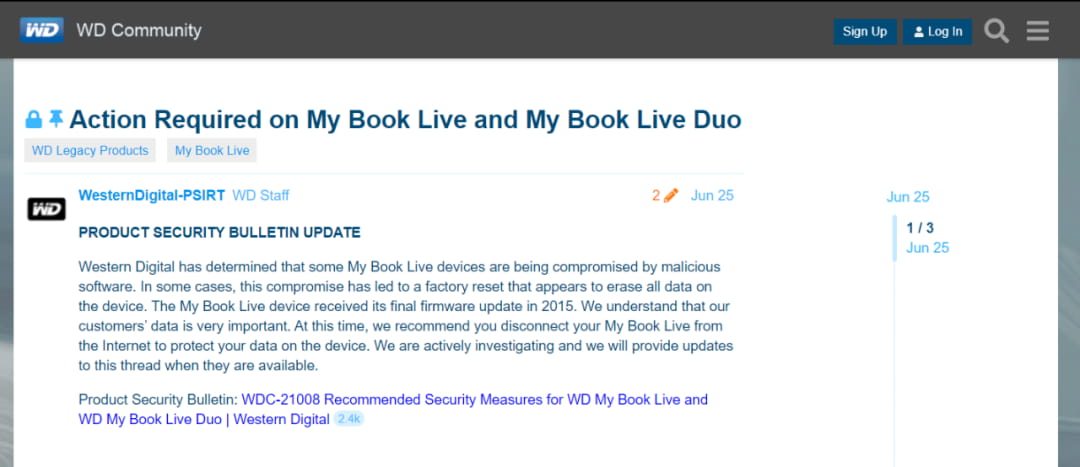Help! All Data in Mybook Live gone – Rescue Deleted Data from WD My Book Soon!!!
"Your WD MyBook Live has suddenly lost all its data, with directories appearing empty and showing a full capacity, despite previously being almost full."
- Quick Navigation
- Part 1. What Happened to My Book Live
- Part 2. How to Rescue Deleted Data from WD My Book
Part 1. What Happened to My Book Live
Many users have reported experiencing data loss on their WD Mybook devices, with some citing a factory reset as the cause of deleted files. This is not an isolated incident, as numerous threads on the WD forums attest, with multiple users sharing their experiences of losing data due to a factory reset on their devices.

The user shared a log showing the factory reset performance on June 23rd.

If all the files on your My Book are deleted, you can try contacting Western Digital (WD) support for assistance. They may be able to provide guidance on recovering your data or offer options for purchasing data recovery software or services. In a statement, WD officials have emphasized the importance of regularly backing up your data to prevent data loss and have also offered support for customers who have experienced data loss.
Western Digital officials have confirmed that a vulnerability in their My Book Live devices has been exploited, leading to unauthorized access and data theft. To prevent similar incidents, users are advised to disconnect their My Book Live devices from the internet. An investigation is ongoing to determine the full extent of the issue.

Part 2. How to Rescue Deleted Data from WD My Book
To recover lost files after a factory reset on your My Book, start by disconnecting it from the internet. If files were deleted, use a data recovery software like Deep Data Recovery, which can scan your device for free and display recoverable files. This software is a professional tool that can help you retrieve your lost data.
Your Effective WD My Book Data Recovery Software
- The software has two scan modes: Quick Scan, which searches for files with complete information, and Deep Scan, which searches for files even when some file properties have been erased.
- A software supports daily used file 100 types, covering pictures, videos, documents, and more in over 1000 file formats.
- This software is built with the latest data recovery technology and is regularly updated to improve its file recovery capabilities.
- This software recovers files from external hard drives and disks, restoring them even after deletion, factory reset, virus attack, formatting, or raw hard drive issues.
- A standalone version of the software for recovering files deleted from WD My Book Live devices, designed to run on macOS or Windows, allowing users to recover their deleted files without needing to access the device directly.
Step-by-step guide for how to rescue factory reset deleted data from WD My Book
Step 1. Connect the WD My Book Live Device
Connect the WD My Book Live device to your computer, and ensure it's recognized as an external hard drive. Do not attempt to manually search or transfer files.
Step 2. Install WD My Book Live data recovery software
Click the download button to get the installation package of the data recovery software, available in both Windows and Mac versions, and install it on your computer.
Step 3. Scan WD My Book Live Device
To recover data from a Western Digital external hard disk, launch the best recovery software and click "Next" in the first window. If you want to prioritize scanning for specific file types, deselect other files to speed up the process. Next, select the WD My Book Live Device and click "Scan" to begin the recovery process.

Step 4. Preview and recover files from My Book
After the scanning process is complete, all recoverable files will be displayed. You can select file types and files to preview, and when you find the target files, select them and click "Recover" to save them on your computer. Please note to save them on your computer, not on the My Book device, to avoid data loss.

Deep Data Recovery is a free tool that scans for recoverable files, but if you want to recover selected files, you need to upgrade to the full version.
Western Digital (WD) is a well-respected brand for hard drives and data recovery services. Unfortunately, their users were shocked when they lost their data. Files are precious and sometimes can be recovered, but sometimes it's impossible to retrieve them. To avoid data loss, it's essential to remember what to do and how to prevent it.
1. Stop using the hard drive when files are deleted or lost, as further actions may cause the files to be overwritten and become unrecoverable.
2. To recover lost or deleted data from your hard drive, consider installing a reliable data recovery software tool on your computer. This can significantly increase the chances of successful data recovery.
3. To ensure important files are safely backed up, it's recommended to do regular backups. This can be done manually by copying files to a computer, USB flash drive, or external hard drive. Alternatively, a backup software tool like Qiling Disk Master can be used to automate the process, allowing you to schedule backups to run in the background. This way, you can have multiple copies of your files without having to manually do the backup each time.
4. Using cloud services can be unreliable, as there's no guarantee that data will be safe from issues. Storing files in the cloud and syncing them remotely can sometimes result in data inconsistencies, making it difficult to maintain accurate records.
Related Articles
- Recover Data from WD My Book Essential/Live
- Recover Deleted Files from WD My Cloud
- Recover Data from WD My Passport
- Recover Deleted Files from LaCie External Hard Drive
- Recover Deleted Files from a Toshiba External Hard Drive
- How to Recover Files from WD External Hard Drive
- Recover Data from Dell Laptop Hard Drive
- How to Recover Deleted My Documents Folder
- Recover Data from HP Simplesave External Hard Drive